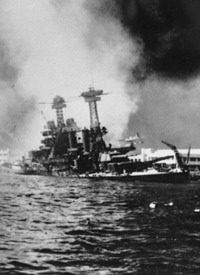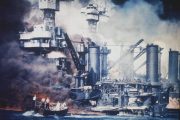
True history is not served if all that is remembered about December 7 is that it is the 61st anniversary of Japan’s surprise attack on Pearl Harbor. On that day America lost 18 naval vessels including eight battleships, 188 airplanes, over 2,000 servicemen — and its innocence about government lies, coverups, and deceit.
Hundred of books have been written about that fateful day, and yet only a few have dared to expose the whole story. And for the most part, those titles and authors remain unknown even today. A major first effort to understand the relevance of the attack on Hawaii in light of world history was undertaken by Harry Elmer Barnes in his magnum opus Perpetual War for Perpetual Peace. In his piecing together of history to build his conclusion that Roosevelt knew the attack was coming, Barnes quoted Eleanor Roosevelt on the day after the attack: “They hit us harder than we expected.” John Toland wrote in his The Rising Sun about the alleged “mistake” that led to the attack on Pearl. James Perloff’s The Shadows of Power: The Council on Foreign Relations and the American Decline, published in 1988 and updated in 2002, explained the goals and methodology of the men and organizations pulling the strings of political power and gave the serious student of history the background needed to understand the final and most complete summary of what happened in December of 1941: Robert B. Stinnett’s The Day of Deceit.
To invite the skeptic to investigate further the events in late December, 1941, one may consider just a few quotes from those intimately involved in the dark, secretive machinations that led to that “Day of Infamy.” About those quotes, Perloff stated that “comprehensive research has not only shown [that] Washington knew in advance of the attack, but deliberately withheld its foreknowledge from our commanders in Hawaii in the hope that the ‘surprise’ attack would catapult the U.S. into World War II.” And politicians’ statements prove him out.
Oliver Lyttleton, British Minister of Production, stated in 1944: “Japan was provoked into attacking America at Pearl Harbor. It is a travesty of history to say that America was forced into the war.” Robert Sherwood, FDR’s biographer, said that “if the isolationists had known the full extent of the secret alliance between the United States and Britain, their demands for impeachment would have rumbled like thunder throughout the land.” Forcing Japan to make the first overt move was confirmed by Roosevelt’s Secretary of War, Henry Stimson, who wrote in his diary just three weeks before the attack: “We face the delicate question of the diplomatic fencing to be done so as to be sure that Japan is put into the wrong and makes the first bad move.” A few days later Stimson added: “The question was how we should maneuver them [the Japanese] into the position of firing the first shot.”
The question of motivation and purpose behind this maneuvering was supplied by Perloff, who had considered four possible explanations for the attack: 1) Washington was caught by surprise; 2) Washington “blundered” and “forgot to warn [the commanders at] Pearl Harbor”; 3) FDR and his inner circle knew that the attack was coming, but let it come as it served their purposes to get America into the war; and 4) the “one more consistent with the facts: The role of pro-Communist and globalist influences within the FDR administration. As former Navy Secretary Frank Knox wrote: ‘Collectivists of every sort support Mr. Roosevelt. That is natural. For at the root of his philosophy lies the view, shared alike by Communists and Fascists, that individual liberty under democracy as hitherto practiced in this country is no longer desirable or feasible.’”
To hold the naïve and historically simplistic view that Pearl Harbor was a surprise simply reflects a lack of understanding about how the world then, and now, really works. While remembering the sacrifices of those who perished at Pearl in December 61 years ago, one must also remember that their sacrifices were planned in advance as a steppingstone to the diminishment of America then and the rise of the totalitarian state today.
Photo of attack on Pearl Harbor in 1941: AP Images
Related articles:
Pearl Harbor: Hawaii Was Surprised; FDR Was Not
Pearl Harbor: Motives Behind the Betrayal



